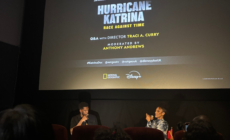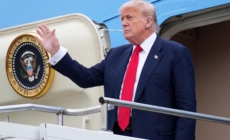-
How to Watch Indiana Fever vs Chicago Sky: Live Stream WNBA, TV Channel - 11 mins ago
-
Thailand-Cambodia Fighting Forces Thousands to Flee - 14 mins ago
-
Almost 20 Years After Katrina, a Filmmaker Visited New Orleans. Everyone Told Her the Same Thing. - 46 mins ago
-
The Raw Power of Repentance - 58 mins ago
-
Can a county fire a sheriff behind closed doors? Advocacy group threatens to sue for access - about 1 hour ago
-
Woman Due to Give Birth on Sister’s Wedding Day, Shock at What Happens - about 1 hour ago
-
José Andrés: People of Good Conscience Must Stop the Starvation in Gaza - 2 hours ago
-
How to Watch Indiana Fever vs Chicago Sky: Live Stream WNBA, TV Channel - 2 hours ago
-
Dozens of Wildfires Burn in Greece and Turkey as Temperatures Soar - 2 hours ago
-
Donald Trump’s Favorability Rating Falls With AAPI Adults - 3 hours ago
Plastics Experts Hope for a Treaty That Takes a ‘Big Bite’ Out of Waste
Beginning August 5, negotiators from around the world will gather in Geneva for another attempt to reach agreement on a global treaty on plastic waste. It’s been three years since the United Nations Environment Assembly pledged to forge an international agreement to address the growing crisis of plastic waste that is clogging rivers, killing marine wildlife and causing human health concerns.
The last round of talks ended in December without an agreement. In Geneva, negotiators will attempt to break the stalemate between countries that want a strong treaty limiting the total global production of plastic and a few plastic and petroleum producing nations that oppose such a cap.
On Thursday, Newsweek hosted the panel discussion “Turning the Tide on Plastic Waste” with experts from academia, industry and environmental groups who unpacked some of the main issues and assessed the chances for a meaningful treaty.
“This is a once-in-a-lifetime opportunity for us to actually come together and solve this,” marine biologist Douglas McCauley said in the panel discussion. McCauley directs the Benioff Ocean Science Laboratory at the University of California, Santa Barbara, and his lab has modeled how different policies can reduce the global flow of plastic waste.

Photo-illustration by Newsweek/Canva
“One of the biggest and most exciting findings that came to me from this research was actually seeing that we could end plastic pollution,” McCauley said. “We saw in the research that you could put in just four policies and reduce plastic pollution by 91 percent.”
McCauley and his colleagues found that policies to improve the economics of plastic recycling, better fund waste management around the world and limit the production of new, or virgin, plastics could together cut most of the plastic waste within the coming 25 years.
A business-as-usual course, he warned, risked doubling plastic pollution by mid-century.
Some countries and some U.S. states have taken steps to limit waste, end single-use plastics and boost the woefully low rates of plastic recycling.
“The problem is that each of those things on their own is not enough,” panelist Erin Simon said. As vice president and head of plastic waste and business at the World Wildlife Fund, Simon has developed business partnerships on plastics and has monitored the treaty talks.
Although the last negotiations fell short of consensus, Simon said the talks built strong momentum around key policy solutions.
“The debate now is a real political one,” she said. “How do we make that work for 190 countries?”
Steve Alexander, president and CEO of the Association of Plastic Recyclers, said the negotiations offer an opportunity for global players in the plastics industry to think comprehensively about the full life cycle of products.
“The treaty discussions are the first time that we’ve gotten together and said, ‘OK, what is the scope of the problem? How do we solve the problem?” he said.
Alexander said the recycling industry wants to see a treaty outcome that helps to level the economic playing field between recycled plastics and new, or virgin, plastic materials.
“We have to decouple the price of recycling from the price of virgin in order for us to really begin to address the recyclability and grow the market,” he said.
One way to promote the use of recycled plastic is to limit the production of new plastic.
Last month at an ocean conservation conference in Nice, France, representatives from 95 countries—a majority of the nations in the U.N. treaty negotiations—issued a statement they labeled a “wake up call” in support of an ambitious treaty.
“Addressing the increasing and unsustainable levels of production and consumption of plastics is essential,” the statement read. “We therefore call for the adoption of a global target to reduce the production and consumption of primary plastic.”
However, a majority will not necessarily determine the outcome of the U.N. negotiating process that emphasizes consensus among all parties. At previous negotiations, a small bloc of countries led by Saudi Arabia and Russia objected to limits on plastic production.
The Geneva talks will also be the first since President Donald Trump assumed office in January. The Trump administration has taken a skeptical view of most environmental regulation and has pulled the U.S. out of other international commitments, such as the Paris Climate Agreement.
Alexander said his group has emphasized the potential for growth in jobs and manufacturing by boosting the recycling industry.
“I don’t know what the Trump administration is going to bring to the table,” Alexander said. “We’re trying to push it from an economic standpoint.”
Alexander, who called himself “a curmudgeon” on the issue, put the chances for agreement on a treaty at 60 percent but added an important caveat.
“I’m much less optimistic we’ll have a treaty with any lasting teeth into it, which to me is the worst thing that could happen,” he said. “If there’s going to be a treaty, it has to have teeth.”
McCauley, who described himself as an optimist, said he thought that “the world has got the memo” about the gravity of the plastic crisis and was hopeful that public pressure would help bring about a strong outcome.
Simon said she was heartened by the progress made so far but concerned that weary negotiators will settle for a weak result.
“I don’t want to celebrate an empty treaty,” Simon said. “I want that bite of that apple to be as big as possible.”
Source link


















